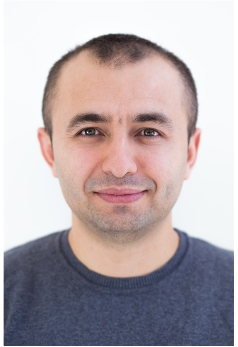
PERSONAL EXPERIENCE
Professor Adil Mardinoglu is an expert in the field of Systems Medicine, Systems Biology, Computational Biology and Bioinformatics. He has been recruited as a Professor of Systems Biology in Center for Host-Microbiome Interactions, King’s College London, UK where he leads a computational group. He also works as group leader in Science for Life Laboratory (Scilifelab), KTH-Royal Institute of Technology in Sweden and led a team of 25 researchers working in the area of computational biology, experimental biology and drug development to develop new treatment strategies for Metabolic diseases, Neurodegenerative diseases and certain type of cancers.
Professor Mardinoglu received his Bachelor’s degree from Istanbul Technical University, Turkey in Electronic and Telecommunication Engineering and his Ph.D. from Waterford Institute of Technology, Ireland in magnetic drug targeting applications. He worked as a postdoctoral researcher at Trinity College Dublin, Ireland and Chalmers University of Technology, Gothenburg, Sweden. His recent research activities include the generation of the context specific genome-scale metabolic models (GEMs) for human cell-types including liver, adipose, muscle, heart, kidney and brain as well as certain types of cancer e.g liver, kidney, colon, prostate and brain (glioblastoma) cancers. His research team also focuses on the integration of GEMs with the other biological networks including regulatory, protein-protein interactions and signaling networks. He employs comprehensive biological networks for revealing the molecular mechanisms of complex diseases, identification of novel biomarkers and drug targets and eventually development of efficient treatment strategies.
Professor Mardinoglu has contributed to the creation of human tissue, subcellular and pathology atlas within the Swedish Human Protein Atlas program and cell atlas within the international Human Cell Atlas program. He has published around 100 research and review papers in different journals including Science, Cell Metabolism, Nature Communications, PNAS, Cell Reports, Molecular Systems Biology and EbioMedicine. He is also co-founder of three different biotech companies focusing on the development of novel drugs for fatty liver disease and different cancer types.
KEY PUBLICATIONS
- An Integrated Understanding of the Rapid Metabolic Benefits of a Carbohydrate-Restricted Diet on Hepatic Steatosis in Humans, A. Mardinoglu, Hao Wu, Elias Bjornson, Cheng Zhang, Antti Hakkarainen, Sari M. Rasanen, Sunjae lee, Rosellina M. Mancina, Matthias Bergentall, Kirsi H. Pietilainen, Sanni Soderlund, Niina Matikainen, Marcus Stahlman, Per-Olof Bergh, Martin Adiels, Brian D. Piening, Marit Graner, Nina Lundbom, Kevin J. Williams, Stefano Romeo, Jens Nielsen, Michael Snyder, Mathias Uhlen, Goran Bergstrom, Rosie Perkins, Hanns-Ulrich Marschall, Fredrik Backhed, Marja-Riitta Taskinen, Jan Boren, Cell Metabolism. Highlighted at SCIENCE TRANSLATIONAL MEDICINE
- Metabolic network-based stratification of hepatocellular carcinoma reveals three distinct tumor subtypes, Gholamreza Bidkhori, Rui Benfeitas, Martina Klevstig, Cheng Zhang, Jens Nielsen, Mathias Uhlen, Jan Boren, Adil Mardinoglu, PNAS (Proceedings of the National Academy of Sciences)
- A pathology atlas of the human cancer transcriptome, M. Uhlén, C. Zhang, S. Lee, E. Sjöstedt, L. Fagerberg, G. Bidkhori, R. Benfeitas, M. Arif, Z. Liu, F. Edfors, K. Sanli, K. von Feilitzen, P. Oksvold, E. Lundberg, S. Hober, P. Nilsson, J. Mattsson, J. M. Schwenk, H. Brunnström, B. Glimelius, T. Sjöblom, P. Edqvist, D. Djureinovic, P. Micke, C. Lindskog, A. Mardinoglu, F.Ponten, Science. Highlighted at NATURE
- Network analyses identify liver-specific targets for treating liver diseases, S. Lee, C. Zhang, Z. Liu, M. Klevstig, B. Mukhopadhyay, M. Bergentall, R. Cinar, M. Ståhlman, N. Sikanic, J. K. Park, S. Deshmukh, A. M. Harzandi, T. Kuijpers, M. Grøtli, S. J. Elsässer, B. D. Piening, M. Snyder, U. Smith, J. Nielsen, F. Bäckhed, G. Kunos, M. Uhlen, J. Boren, A. Mardinoglu, Molecular Systems Biology, 13:938
- Plasma Mannose Levels Are Associated with Incident Type 2 Diabetes and Cardiovascular Disease, A Mardinoglu, A Stančáková, L A Lotta, J Kuusisto, J Boren, M Blüher, N J Wareham, E Ferrannini, Cell Metabolism 26 (2), 281-283
- Personal model‐assisted identification of NAD+ and glutathione metabolism as intervention target in NAFLD, A Mardinoglu, E Bjornson, C Zhang, M Klevstig, S Söderlund, M Ståhlman, Molecular systems biology 13 (3), 916. Highlighted at SCIENCE TRANSLATIONAL MEDICINE
- Integrated Network Analysis Reveals an Association between Plasma Mannose Levels and Insulin Resistance, S Lee, C Zhang, M Kilicarslan, BD Piening, E Björnson, BM Hallström, Cell Metabolism 24(1), 172-184. Highlighted at NATURE REVIEWS ENDOCRINOLOGY
- The gut microbiota modulates host amino acid and glutathione metabolism in mice, A Mardinoglu, S Shoaie, M Bergentall, P Ghaffari, C Zhang, E Larsson, Molecular systems biology 11 (10), 834
- Stratification of hepatocellular carcinoma patients based on acetate utilization, E Björnson, B Mukhopadhyay, A Asplund, N Pristovsek, R Cinar, Cell reports 13 (9), 2014-2026
- Genome-scale metabolic modelling of hepatocytes reveals serine deficiency in patients with non-alcoholic fatty liver disease, A Mardinoglu, R Agren, C Kampf, A Asplund, M Uhlen, J Nielsen, Nature communications 5. Highlighted at NATURE REVIEWS GASTROENTEROLOGY & HEPATOLOGY
- Identification of anticancer drugs for hepatocellular carcinoma through personalized genome‐scale metabolic modeling, R Agren, A Mardinoglu, A Asplund, C Kampf, M Uhlen, J Nielsen, Molecular systems biology 10 (3), 721. Highlighted at NATURE REVIEWS GASTROENTEROLOGY & HEPATOLOGY
- Integration of clinical data with a genome‐scale metabolic model of the human adipocyte, A Mardinoglu, R Agren, C Kampf, A Asplund, I Nookaew, P Jacobson, Molecular systems biology 9 (1), 649
